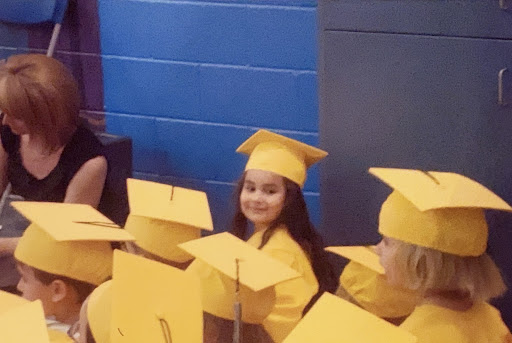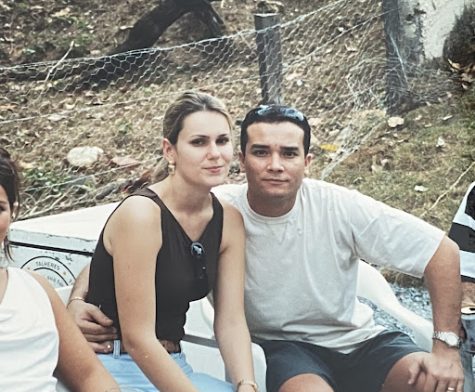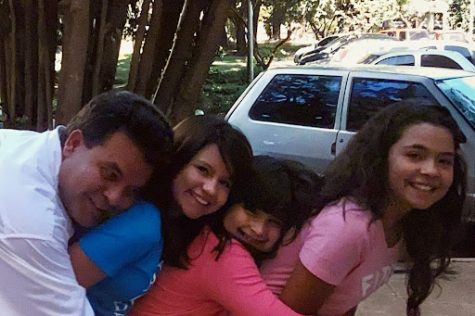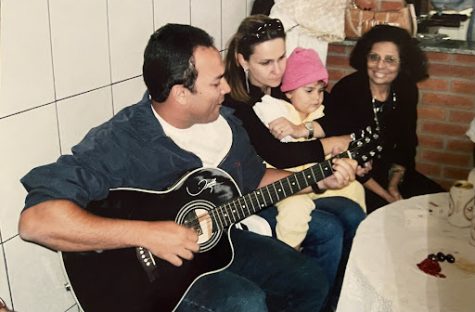Opinion: Being the first in my family to attend college in America

B. Horvath
Me wearing my yellow cap and gown, ready to graduate kindergarten.
April 26, 2022
Whenever discussions about college arise during family dinners, I always ask my dad, “If you could go to any college in the United States, which one would you want to go to?” and he always responds with, “Any. It would be an immense privilege to attend any college here.”
Adaptation is something that has been alive in my family for decades. My grandparents were also immigrants, fleeing the aftermath of World War II in Greece during the 1950s, finding a safe haven in Brazil. My mother experienced being the first in her family to attend college in Brazil, and she describes it as one of the best times of her life. Having the chance to pursue her academic interests beyond high school she expresses is incredibly fulfilling. My father, on the other hand, did not have the opportunity to attend college.

However, even though their educational paths differed immensely, both my parents lacked opportunities. My mother always tells me that in Brazil, people can spend their entire lives working for something and never have the opportunities to pursue them. My mother had passions, she had dreams and aspirations to do great things, and they all got lost when she moved here. According to the Chicago Tribune, nearly two million college-educated immigrants in the U.S. are unemployed or working in low-skill jobs despite years of education and work experience because of the difficult recertification process for their degrees. I want to make up for all my mother’s lost chances.
It took me a long time to understand the importance of my education and the immense privilege that comes with it. My parents have never once in my life pressured me to be the best or to excel in school, but it has always been a moral obligation that I have always felt. I cannot help but feel in debt sometimes for all of their sacrifices.
In discussions I have with my mother about this pressure to perform well in school, she always tells me that it was never my burden to carry. She tells me that we could have always come to America and have everything go wrong and lose everything we have. She stresses that things worked out for a reason and I deserve to be where I am now.

I have learned throughout my years of high school that success is not always about you, but the people who are counting on your success. Sometimes when I think about my desire to succeed, it is a desire to accomplish things for my family more than it is for myself. I cannot think of my career without thinking about how important it is that I make my family proud. I want them to know that I am thinking of them every step of the way.
I could write this article in a million different ways and I do not think I will ever be able to put into words how deeply guilty I feel being given opportunities I know my relatives would give up everything for.
It has definitely been an era of trial and error while attempting to understand the American college process for the first time. My parents have done so much learning about a system that is completely different from anything they have seen before. It is a lot of hours pondering questions like: What does FAFSA stand for? What is an early decision? Are you sure I can give my social security number to the CommonApp website?
“You probably wrote about being an immigrant for your essay, right?” is a question that I have heard way too many times this year. I think many first generation and immigrant students get discredited for their college acceptances, many thinking that they get accepted into colleges to encourage a diverse community. But I think it is an ignorant comment, as many immigrant students have to start completely anew with their college process, unlike those whose families have been familiar with it for generations.

According to Pew Research Center, 70% percent of adults who completed college with at least a bachelor degree had parents with a bachelor’s degree or higher. Adults with parents with bachelors, or higher degrees, have also been found to hold higher medians of wealth and income.
Immigrant and first generation students begin their college process steps behind those who have familiarity with the process, and it is upsetting to listen to people saying that you got in because of a college’s need for a variety in their student body.
It has been a difficult mental process learning about this entirely new system of education, juggling the internal guilt of having such valuable opportunities, and understanding my relation as an immigrant student in a sea of American college students. But it has made me understand the value of my education, the beauty of my background, and the insanely strong support system I have with me. I cannot wait to slowly become the person I want to be for my family and for myself a little more each and every day.
This story was originally published on Etched in Stone on April 12, 2022.



































